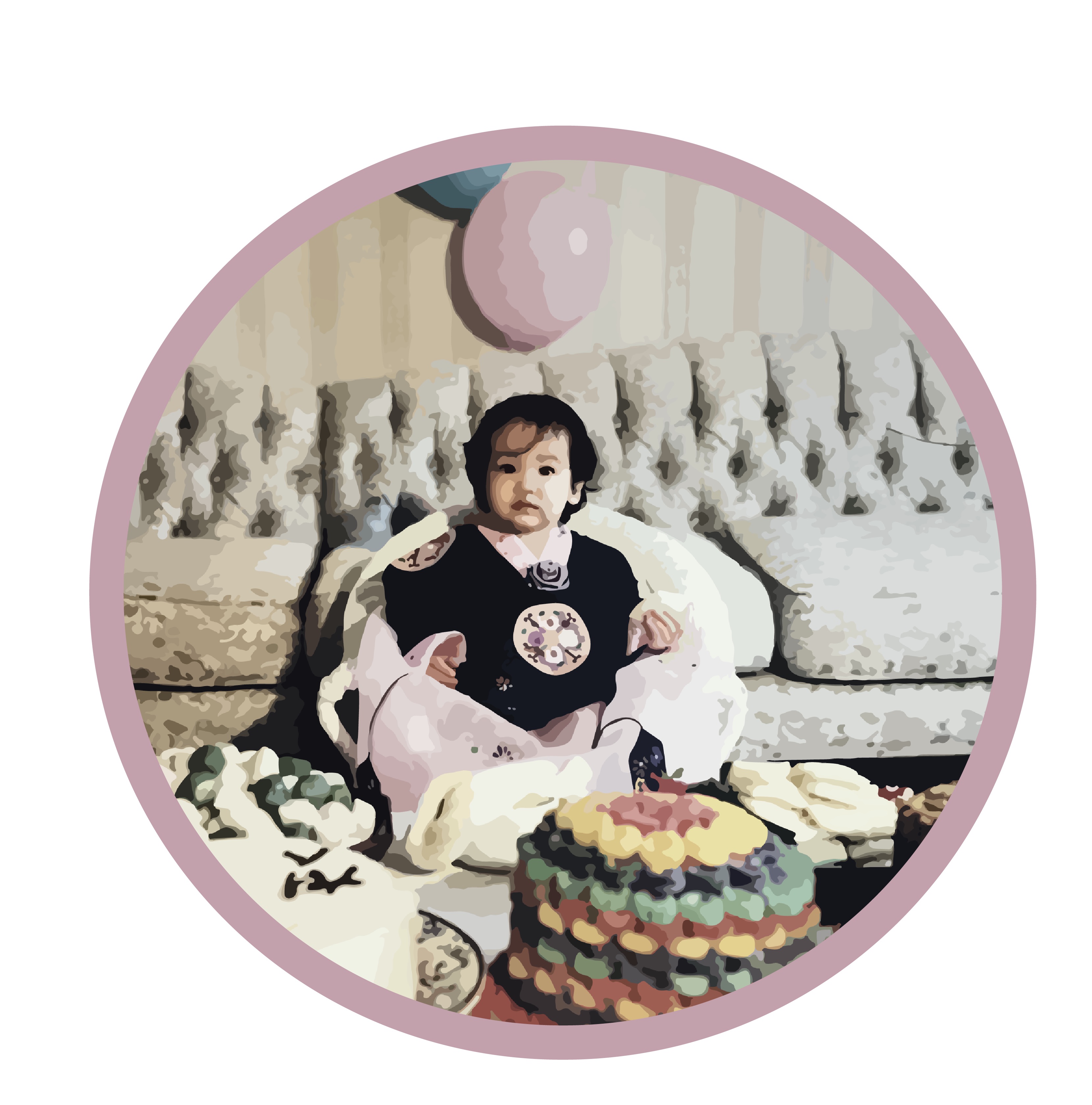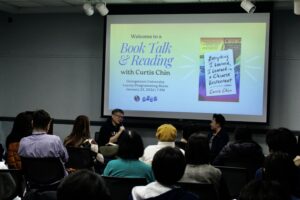“Do you speak Korean?” asked my friend, sitting on the floor of my freshman year dorm room.
“No…”
“Well, have you ever been to the country?”
“No,” I responded, “but—”
“Well, then, you’re not Korean. So stop pretending to be.”
***
When my dad moved to the United States at four years old, he didn’t speak a word of English. But despite the language barrier, the message from everyone was clear: You’re in America, speak English. Nowadays, when my grandparents talk to him, he responds in a different language, his Korean reduced to a mixture of Konglish and small sentences.
As a kid, I used to get angry with my parents for not teaching me Korean when I was a baby. I’d lecture them on the benefits of multilingualism, the missed work and travel opportunities, and how awful it was that I couldn’t have a real conversation with my own grandparents.
My dad would respond, “Hannah, I don’t even speak Korean. How was I supposed to teach you?”
What I didn’t realize then was that my dad can’t have real, complex conversations with my grandparents, either. Even though they live right down the street, he can’t tell his parents about his dreams, hopes, disappointments, or regrets; there are simply no words to describe them.
Despite high levels of bilingualism in the U.S., for most immigrant families, the home language is almost completely lost by the third generation. For many, there’s an overwhelming pressure to assimilate, the first step of which is to speak English as much as possible, even if that means forgetting your first language.
As one of the first Korean families in Baltimore, this process—called first language attrition—happened even faster for us. Without a Korean community to interact with, my dad and his siblings were almost completely immersed in English-speaking environments. As they grew older, English became their dominant language and speaking Korean felt increasingly foreign.
***
Ever since I was little, I’ve dreamed of learning Korean. Being biracial felt by far like one of the most interesting things about me, and I wanted to explore that part of my identity as much as possible.
When I came to Georgetown, I had my first opportunity to take Korean lessons. As I embraced more of my Asian identity, I knew from my dad’s childhood stories that I might face some discrimination, and I was fully prepared to be made fun of for becoming “more Asian” by family back home. What I wasn’t expecting was to feel like I wasn’t Asian enough, and that I’d never, no matter what I do, be accepted as Korean.
At first I thought it was just because I was mixed. My dad is Korean, sure, but my mom is white, and I’ve always looked more like her side of the family. I thought that maybe, when the Asian culture clubs at CAB fair were ignoring me and leaving me off their listservs, they just couldn’t tell I was Korean by the way that I looked.
But then people started straight-up telling me, to my face, that I wasn’t Korean. I’d already been told by white people that I wasn’t white. Now the Asians were telling me I wasn’t Korean, too?
My dad told me that my aunts took a trip to Korea when they were teenagers to improve their language skills. When people heard their broken Korean, they didn’t just look down on them, they would actively harass them. For the second time in their lives, they were foreigners.
To other Asians, swapping Korean for English wasn’t an act of survival; it was a betrayal. I still remember being a teenager at camp, when another half-Asian boy asked me if I spoke Korean at home. I told him the truth, and he looked me in the eye, told me that he hated my family, and then walked away.
***
Learning Korean has taught me a lot about my family, but not in the way that I thought it would. For starters, I learned that instead of “spicy red paste,” I’ve been saying “little boy penis” for my entire life. I learned that my name is spelled wrong on both my driver’s license and my passport, but in different ways on each document, and that the instructions on the backs of my Korean beauty products are actually in English, just spelled out in Korean characters.
In class, it’s strange to learn about common Korean foods and traditions that, in my neighborhood, were something unique to my family. It turns out that eating pears and hard boiled eggs with cold noodles is normal in Korea, not just a weird thing I liked while growing up.
But there are other things that do make us unique. We eat our kim pop with hot dog slices, and we eat our bowls of rice with bacon and Royal Farms fried chicken. And we also, of course, speak really messed up Konglish.
***
I wish that I were fluent in Korean. I wish that I grew up in a bilingual household, and that I didn’t have to learn my family’s language like an outsider. I wish that being American didn’t prevent me from being Korean, and vice versa; I wish that people could wrap their heads around the fact that it’s possible to have more than one identity. I wish, I wish, I wish.
I’m still not sure what is the best way to reconnect with my family’s culture. With the loss of the language, I feel our customs, traditions, and even our old family recipes slipping through my fingers. I fear that by the time I have kids, I won’t know which recipe to use when making them seaweed soup for their birthdays, where to get them the right kind of hanbok, or how to give them a Korean name.
For all of the articles I’ve read about language and culture loss in immigrant families, none of them have given me a solution that doesn’t involve packing up, leaving my family, and living in Korea for the rest of my life—that is, other than learning the language.
Will learning Korean magically reconnect me to my heritage? Will it give me an all-access pass to the inside of the Korean community? No. At least, I don’t think so. But it can open a door.
The last time I went home to Baltimore, I visited my grandma’s house for dinner. She sat me down, handing me some Korean children’s books to practice with, and I told her about my Korean class and my professor.
“What’s her name?” she asked me. I was so stunned that for a moment, I couldn’t find the words to respond. For the first time in my life, I had just understood my grandmother speaking in Korean.







Immigrants children’s experiences growing up are so similar whether they speak the home language or not: identity, bilingualism, racism, belonging, power. So many themes to look at to get a better understanding. Thank you for sharing your experience as a young American Korean or should I say Korean American?
Beautiful work Hannah! I might have the peer health students use this.
So beautifully expressed, Hannah- my heart hurts for you in that lost space between two cultures. I’m proud of you for wanting to bridge that gap and confront the issues surrounding this struggle for yourself as well as others who find themselves in a similar situation. And what a WONDERFUL experience to now begin to connect with your grandparents in these ways!! You amaze me! You always have!! Very proud to say I had the privilege of being your fifth grade teacher! ❤️
Many years your senior, I grew up with an Umma who was a Korean War Bride. She came to the U.S. after meeting my dad who served in the Navy on the USS Valley Forge. Because of Umma’s grasp of the English language, she was employed as a type of med tech and that’s gotta my parents met.
Immersed completely into the South and not even seeking a Korean type of community or network, we three offspring never really learned the Korean language. Even getting Umma to speak of her life in Korea was a challenge as she grew up during the Japanese occupation.
I feel you, Hannah. I was made fun of as a kid because I wasn’t white enough, and then there were expectations of Asian excellence that I couldn’t possess. Now that I’m a grandmother (halmoni) and I crave to know so much about my Korean heritage to pass along to my grandkids. Unfortunately, almost 2 years ago Umma had a stroke which affected both her receptive and expressive language. While she’s generally maintaining as healthy, it’s obvious that her brain has broken in her ability recall words. Even when I ask for Korean names or words, there’s so much difficulty and I question Umma’s accuracy.
Thanks for writing this – because I identify so much with your quest. I pray you find success in grabbing hold of your uniqueness!
BTW – I always said the word for grandfather wrong & Umma told me to quit trying to teach it to my grandkids because it sounded like I was calling my dad(abeoji) a crotch!?
Hannah, I share your story. As the daughter of a Greek immigrant who married an American, I have desperately tried to learn the language. Keep at it. I have definitely found it has opened doors for me.
[…] A personal story at this link […]
I think about this all the time! Such a poignant article. I always think – but what about my family? How do I tell them I love them? How do I tell them about my dreams, my hopes, my disappointments, my regrets, when there are NO WORDS to describe them? Like, I wish my dad could show that he is proud of me. I wish I could have told my grandparents how much I cared about them before they died. I feel isolated from the people who raised me. And I think it is that isolation that sucks the most. I just wish I didn’t feel so alone within my family! Thank you for this article!